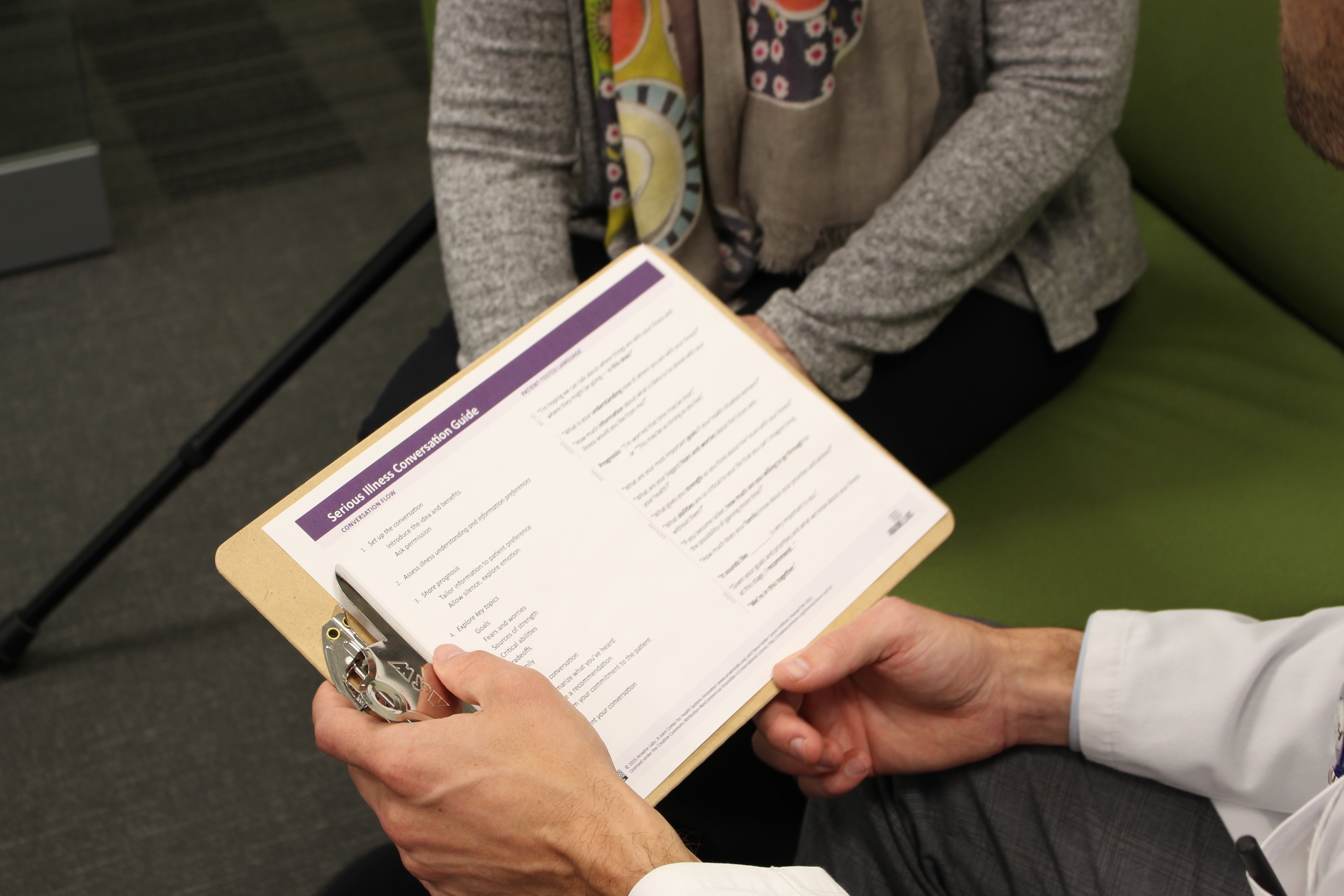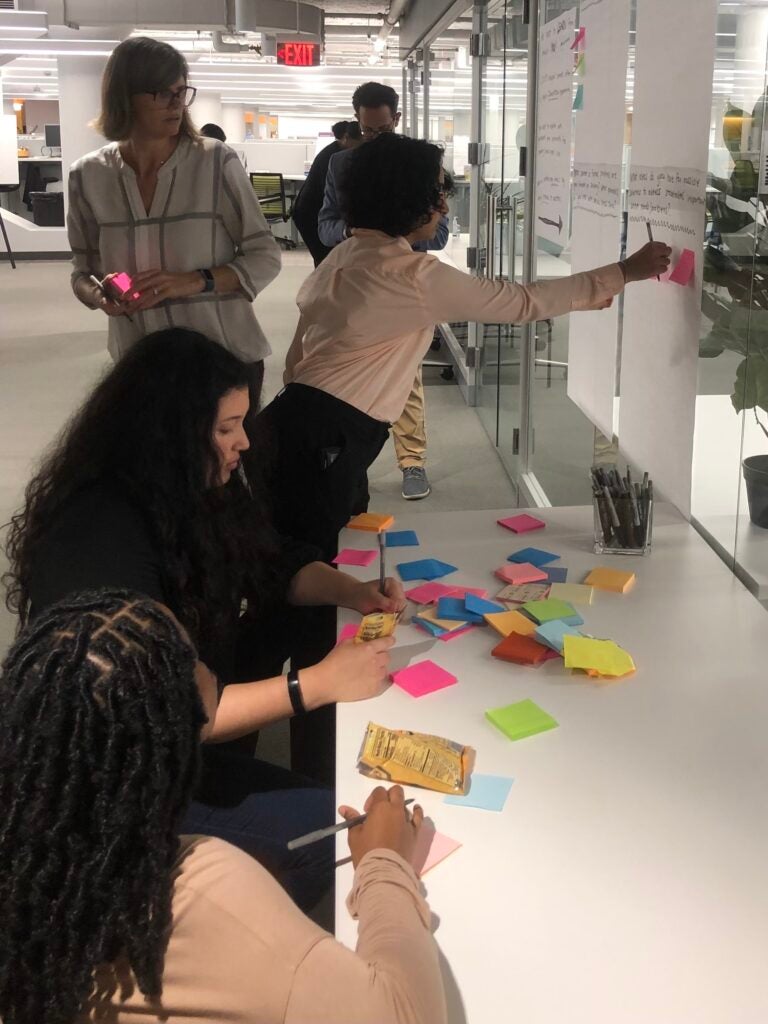The process engaged patients, caregivers, and clinicians to reflect diverse experiences
Talking about what matters most to patients during a serious illness is rewarding – both for patients and for clinicians. Ten years ago, Ariadne Labs’ Serious Illness Conversation Guide was created to make those conversations easier by giving clinicians the language to discuss patients’ values, goals, and priorities for their care. While use of the Guide has spread rapidly across the U.S. and internationally, disparities in access to high-quality serious illness communication and care persist.
The Serious Illness Conversation Guide is a foundational component of Ariadne Labs’ Serious Illness Care Program, which has facilitated more than 1.8 million conversations around the world. The program has been proven to reduce symptoms of depression and anxiety in patients, while helping them to feel more connected to their clinicians and more at peace with their quality of life. Clinicians attest that it improves their satisfaction in their work. While studying the program’s impact, the Serious Illness Care team at Ariadne Labs has also learned about opportunities to improve the accessibility and inclusivity of the Guide.
“Through partnerships with clinicians and leaders from federally qualified health centers and safety net hospitals, we learned that elements of the Guide language that weren’t resonating with some patients,” said Erik Fromme, MD, Faculty for Ariadne Labs’ Serious Illness Care Program. “At any given time, 70% of health systems in the U.S. have the ability to pull the guide into their electronic health record and use it as their standard of communication, so it’s really important that the language being used is sensitive to the needs of all patients, particularly those who experience social vulnerabilities.”
Engaging the serious illness community
In 2021, Ariadne Labs’ Serious Illness Care team began a two-year effort to revisit the Guide language to ensure that conversations are accessible for everyone, regardless of race, culture, physical abilities, gender identity, or other personal factors. The process relied heavily on input from more than 100 stakeholders, including interprofessional clinicians working in a range of health care settings as well as a diverse group of patients and caregivers with varying illness experiences.
The update process began with a virtual convening of the Serious Illness Care Community of Practice, a group that includes patient and caregiver advocates as well as a diverse cohort of serious illness care professionals. Together, this group examined the language of the Guide and noted opportunities for change. For example, they identified that a question that previously referenced a patient’s “critical abilities” could feel judgmental to individuals living with a disability. The language was revised to instead focus on activities that bring joy or meaning to people’s lives. In addition, they expressed the need to ensure that patients have a say in their care and an authentic partnership with their clinicians; language used to introduce the conversation was updated to emphasize the opportunity for patients and care teams to “talk together” about the patient’s health and what matters to them personally.
From there, Ariadne Labs forged a collaboration with the Patient Advocate Foundation to further refine the language and examine the updated Guide in patient focus groups and individual interviews.
“We wanted the patient and caregiver voices to have the most weight in making the final decisions about Guide revisions,” said Jo Paladino, MD, Associate Faculty for Ariadne Labs. “Our partnership with patient and caregiver advisors reinforced and confirmed the importance of word choice and language, especially when engaging individuals who experience marginalization due to their racial, cultural, and disability identities.”
This partnership led to important changes to enhance language that builds rapport among patients and clinicians, such as the addition of a question about hopes, replacing the word ‘illness’ with ‘health,’ and strengthening aspects of the Guide that focus on emotional support and aligning with patients around shared hope for desired outcomes and goals.
“Overcoming inequities in health care is central to the mission of the Patient Advocate Foundation,” said Rebekah Angove, PhD, Executive Vice President for Research and Evaluation at the Patient Advocate Foundation. “We’re pleased to have partnered with Ariadne Labs on this work to ensure that a diversity of patient experiences are reflected and that all patients have the opportunity to benefit equitably from serious illness conversations.”
Small but meaningful changes
Paladino notes that while many of the changes may appear to be minor, even small changes can have a powerful impact for people who are marginalized by health care systems due to their race, culture, or other identities. The revised Guide offers more positively-framed language to strengthen connection and partnership between clinicians, patients, and caregivers.
Throughout the process, patients and caregivers also highlighted the importance of the skills and techniques clinicians use in having serious illness conversations. They emphasized that when clinicians remember personal details, convey warmth and compassion, actively listen, and validate emotions and strengths, the conversation feels more authentic, human, and personal.
Despite the changes, the Guide maintains its focus on understanding patients’ values and priorities as they face a serious illness and prepare for what may be ahead. In addition, the Guide maintains its adaptability so that it can be customized to meet different needs.
“In ten years of working with health systems to implement the Serious Illness Care Program, it’s been a privilege to learn from those engaging in these conversations day in and day out,” said Paladino. “This process allowed us to incorporate all of those learnings and truly center the voice of the patient in these conversations.”




